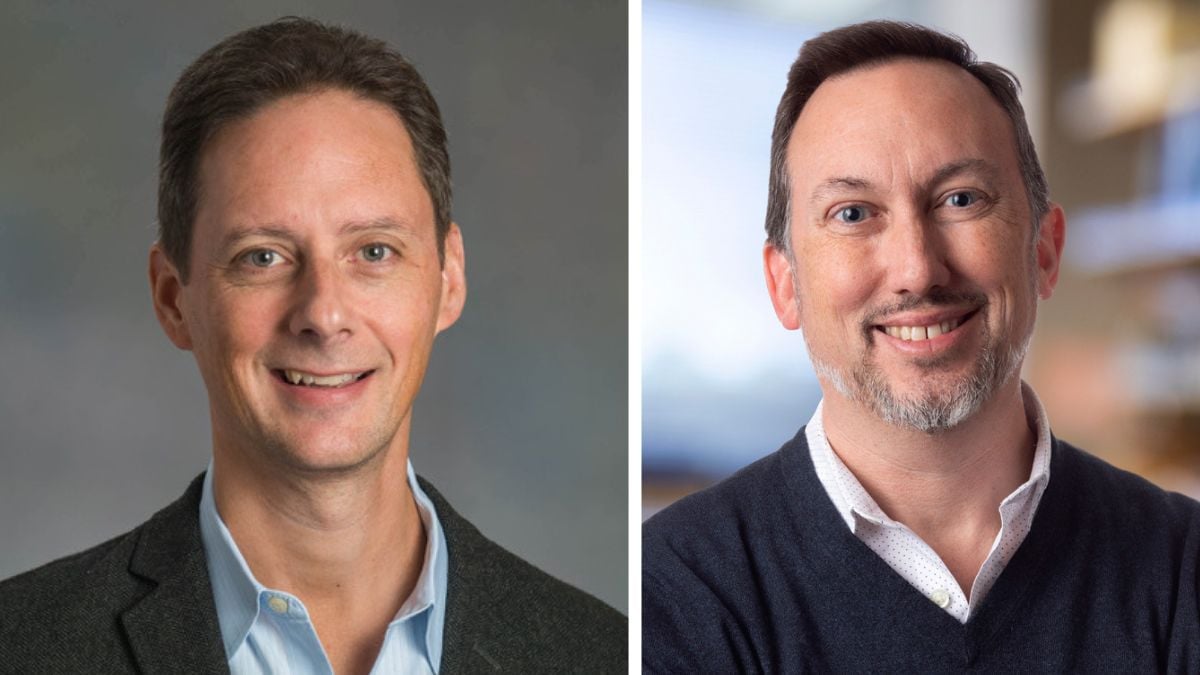Getting to Know Brendan Manning, PhD & Reuben Shaw, PhD
Date Posted: Wednesday, October 11, 2023
Brendan Manning, PhD & Reuben Shaw, PhD
Brendan Manning and Reuben Shaw will debate mTORC1 vs. AMPK in the Battle for Metabolic Supremacy in a MetNet showdown on October 12th.
Dr. Manning is a Professor in the Department of Molecular Metabolism at the Harvard T.H. Chan School of Public Health and the Department of Cell Biology at Harvard Medical School, and a Faculty Member of the Dana-Farber/Harvard Cancer Center. Dr. His research is defining the molecular interface between cellular signaling networks and metabolic networks, as it relates to both normal physiology and diseases with metabolic dysregulation as a key feature, including cancer, diabetes, neurological disorders, and aging-related diseases. His lab is focused in part on defining the regulatory mechanisms and functions of a signaling network converging on the tuberous sclerosis complex (TSC) protein complex and the mammalian target of rapamycin (mTOR), which relay an array of extracellular and intracellular growth signals to control the balance between anabolic and catabolic metabolism in cells, tissues, and tumors.
Dr. Shaw is a Professor and William R. Brody Chair at Salk Institute for Biomedical Research. He investigates mechanisms connecting cell metabolism to growth control. His lab utilizes biochemistry and genetic mouse models to study an ancient signaling pathway that is deregulated in both cancer and type 2 diabetes. His work is focused on a highly conserved signal transduction pathway controlled by the AMP-activated protein kinase (AMPK) that, when deregulated, leads to cancer and metabolic disease. He discovered that a gene frequently mutated in cancer (LKB1) regulates AMPK. This enzyme is critical for the therapeutic benefit of metformin, the most widely used type 2 diabetes medication. Since this discovery, Shaw has wondered if drugs originally designed to treat metabolic diseases could also work against cancer.
We asked both men to answer the following questions, “first thing that pops up into your mind” style, with a two-sentence maximum. They did not know how the other responded.
What is a fun or unusual tradition in your lab?
RS: Lab retreat to Santa Barbara area or Palm Springs area.
BM: Annual group Halloween costumes inspired by TOR (e.g., Harry PotTOR, UnTOR the Sea, TOR Story, etc…).
Name one interesting protein other than mTOR or AMPK.
RS: TFEB.
BM: Easy one – TSC2.
What is one thing you admire about your co-speaker?
RS: He is an excellent leader.
BM: His unusual ability to multi-task effectively.
What do you feel you are better at than your co-speaker?
RS: DJing music at a party.
BM: Staying on-time during a scientific talk.
Name a recent movie or TV show you enjoyed.
RS: Ted Lasso / Black Mirror
BM: Winning Time: The Rise of the Lakers Dynasty (although I did not enjoy the portrayal of Larry Bird as a backwards hick).
What is one rewarding aspect of your job?
RS: Making new discoveries and being surprised at how physiology, cancer, and metabolic diseases work mechanistically.
BM: Mentoring brilliant and eager young scientists.
What is something that is on your ‘bucket list’?
RS: Taking ‘Battle of the Heavyweights’ on a nationwide tour!
BM: Hiking the Appalachian Trail.
What is a talent you have that most people don’t know about?
RS: I was a DJ for like 20 years and I know the words to thousands of songs.
BM: I am very good at ice skating. I started playing hockey in New Hampshire at 5 years old.
Give us one ‘learn from my mistake’ piece of advice for graduate students or postdocs.
RS: Need to balance one’s persistence with a favorite project not getting far fast with ability to restart on a new project = need ability to do both.
BM: Spend as much time critically reading the scientific literature as you do at the bench.
